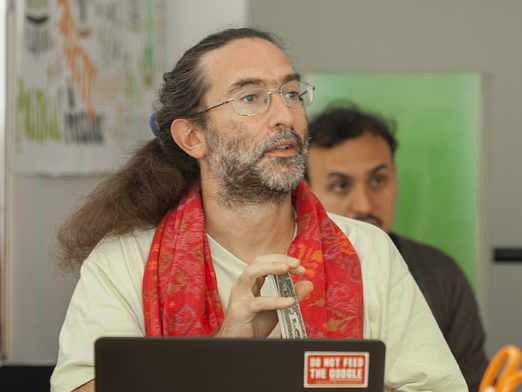I am often told that money is like energy; that it flows around the community creating economic activity remaining essentially the same, never being destroyed. But this metaphor doesn't satisfy me. it works quite well for cash whether fiat or backed, but most of our money is not cash and in fact behaves very differently.
It is tempting when exploring the True nature of money, as theologians study the bread in the Eucharist, to study the tokens and the exchanges. One popular approach is to posit a substance called 'value' which resides in the tokens, either intrinsically because the tokens are made of some valuable stuff (use value), or by government decree (exchange value). This is a bit like the theory of transubstantiation in which the bread 'changes' into into the body of Christ.
But this whole approach assumes that money is some kind of stuff which moves from hand to hand. Even fiat money is a commodity insofar as I value it more than what it can buy.
When we look at the different ways of issuing money, we see clearly that 97% of modern money is NOT a commodity. It comes from nothing and exists only on bank balance sheets. This is accounting money, the kind used in mutual credit systems. And it has some other interesting properties:
- For every unit of money created as a liability, there is a corresponding asset created with equal and opposite value
- The money flows into circulation and at the appointed time some money - not necessarily the same money is pulled out of circulation and cancelled out against the asset, leaving nothing.
- When we look at cash we might imagine each piece moves around the economy independently of other money, like a ball bouncing randomly around a pinball machine. But with accounting money you can't mark the bills and track one piece of money just like you can't pinpoint an electron. A better analogy is a field
At least, that's when it works.
When we treat money as a commodity, the flows get out of sync. When we hoard money and relend the same money twice we prevent it from returning to source. When we just read the peaks and not the troughs, we miss the coming tsunami.
When, for cultural reasons, borrowers take all the responsibility and risk, while lenders charge rent on their absent 'property' the two parties will never dance well together, leading to gluts and dearths and arhythmia.
So I think that credit money, accounting money is very much like electricity, and the conceptual leap we need to make if we want master it is as big as from Newtonian mechanics to Quantum mechanics.

Comments2
Very promising
Very promising approach.
Indeed, money is not coins moving around, it is account money increasing or decreasing balances. Corollary one is that coin mining cryptocurrencies lead nowhere.
Indeed, credit money is a great financial invention moving our economy. Not to be abolished, but democratized, interest suppressed.
But the wave metaphor of needs further elaboration. What moves as waves is the probability that after certain number of transactions an increase here will result in an increase of the balance at another account.
This is what we calculate as solvency analysis associated to any credit. The borrower shows all possible future transactions that will result in incomes and outcomes around his account. The game is to demonstrate that, with high probability, they will result in incomes enough to pay the credit back.
If this is true, he should get the credit.
What is a credit? Its a quantum effect by which, in places where the money wave is high, the money actually appears before time. A time tunnel effect.
See Credit is the Time dimension of money
"The money flows into
Well, nothing but the interest on the loan, which to extend your analogy might be seen as electrical resistance, or friction; the economy always loses energy to rent-seekers. Entropy increases. And insisting that the issuer of the currency must balance its "budget", means that instead of a closed system where new energy is continually injected, we have an isolated system where thermodynamic heat death (or secular stagnation, if you prefer) is inevitable.